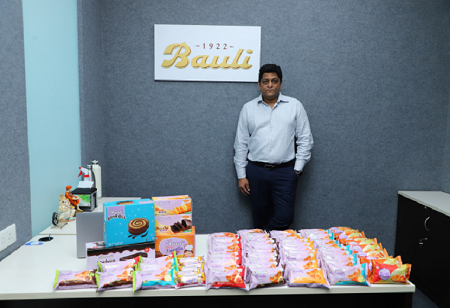
Abhinandan Dhoke, Managing Director, Bauli India, is responsible for the Asia business. With more than 24 years of experience in the FMCG sector, Abhinandan is passionate about taking up newer ventures and challenges. His forte is however 'servant leadership where he focuses more on engagement and collaboration toward the realization of the Organization's goals.
Consumer trends wield a profound influence on the strategies employed in food manufacturing, particularly in the Indian context. With a growing emphasis on healthier and sustainable food choices, the industry is witnessing a significant shift. In India, the demand for plant-based and alternative foods is on the rise, prompting strategic adaptations to meet evolving consumer expectations. Post-pandemic, the industry in India has experienced notable changes, addressing factors such as increased food safety measures, the surge in online shopping, and the demand for convenient yet nutritious options. Amidst these shifts, the challenge remains in aligning clean labels and ingredient transparency with product stability and regulatory compliance, reflecting a delicate balance between consumer desires and industry standards.
In the past decade, numerous industries, spanning from green tea to protein supplements and plant-based foods, have undergone remarkable transformations to align with evolving consumer habits. Notably, green tea has surged in popularity due to its recognized health benefits, symbolizing a broader trend toward wellness-focused choices. This wave of innovation extends to diverse sectors witnessed through the rise of the protein industry, alternate supplements, and plant-based alternatives. The pandemic acted as a catalyst, intensifying the revolution by amplifying health consciousness. This transformative journey emphasizes the adaptability of industries, demonstrating a collective commitment to meeting dynamic consumer needs and preferences.
India typically follows Western trends with a delay of four to five years before swift adaptation, driven by its growing population and economy. Gen Z and Gen Next, financially independent demographics, are leading a shift towards sustainable and health-centric alternatives. Renowned global brands like Beyond Meat and Just Egg, specializing in plant-based foods, have set the stage. Concurrently, a wave of startups, including Imagine Meat and launches by companies like Leashes, reflects a collective industry push towards plant-based options. Despite 70% of the population still favoring meat, the surge in plant-based interest, with over 40% citing ethical, gluten intolerance, or health reasons, reflects a significant consumer-driven transformation. The industry is swiftly aligning with this shift in consumer demand, emphasizing the momentum towards plant-based alternatives.
As witnessed in the wake of the pandemic, the most profound technological revolution manifested in the surge of e-commerce and quick commerce. Witnessing the rise of numerous direct-to-consumer (D2C) platforms, these tech-driven entities leverage advancements to personalize services based on individual needs—from body types to allergies and health requirements. Additionally, a myriad of apps tailored to offer customized diets further complements this transformation. Noteworthy wellness centers and virtual platforms like Healthify and Food Darzee have become instrumental in benefiting individuals. The technology infusion not only ensures accessibility to information but also facilitates virtual interactions with experts, making health and wellness more accessible. In essence, this technological revolution is fundamentally reshaping the landscape, offering personalized and disciplined pathways toward self-improvement.
The post-pandemic era has ushered in a monumental revolution, with a resounding realization among consumers that health takes precedence over all else. This profound shift in consumer behavior is evident across various industries, witnessing substantial growth in Ayurveda, organic, health food, and millet sectors. The days of rampant consumption of junk food and chocolates, even among the youth, are fading away. Instead, there is a resounding demand for sustainable and healthier food solutions. The industry has responded swiftly, with even giants like ITC venturing into millet products and numerous startups entering the fray. The emphasis is on providing holistic and healthier options that are also affordable.
In this transformative space, credibility is crucial. The credibility of offerings is built on a foundation of food safety, nutritional values, and transparent ingredient labelling. The industry's concerted efforts in these aspects are instrumental in steering the shift towards healthier alternatives. As we move forward, the trajectory of this evolution is poised for disproportionate growth in the next decade, propelled by a collective commitment to meeting the heightened health-conscious demands of an informed consumer base.
In fact, the surge in the popularity of clean labels is undeniable, reflecting a consumer-driven demand for transparency and authenticity in food products. However, the pursuit of simplicity in labelling comes with its set of challenges. Striking a balance between making labels more straightforward while ensuring compliance with statutory requirements is a nuanced task. It is not just about adopting generic names; scientific precision is essential, in detailing the actual components in the food. This delicate equilibrium between simplicity and regulatory adherence is actively navigated by the industry, brands, and products. The quest for clean labels involves a constant effort to provide clear information to consumers while meeting the intricate standards set by compliance and legal requirements.
The food industry, in my view, stands out as a beacon of sustainability and adaptability, consistently evolving to meet changing food habits and consumer behaviors. Over decades, it has witnessed revolutions in products, packaging, and categories. From the emergence of protein bars to the resurgence of millets, the industry stays ahead of innovation. In the diverse landscape of India, with its growing economy and dynamic cultural shifts every 300 kilometers, the food industry not only survives but thrives. The key lies in its ability to adapt to consumer needs prioritizing convenience, comfort, and affordability. Observing the resilient and dynamic trajectory of the food industry in India is indeed a source of satisfaction and optimism.
We use cookies to ensure you get the best experience on our website. Read more...